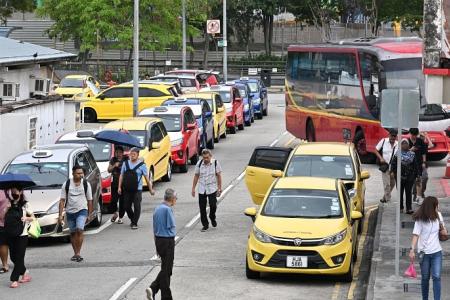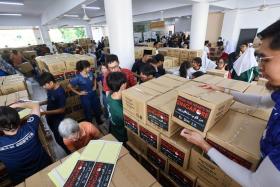Why S’poreans use illegal cross-border chauffeured rides
For Ms Kuan (not her real name) and her husband, making day trips across the border to indulge in good food and pampering treatments is a cherished ritual.
When travelling as a couple, they would simply hop on the Causeway Link bus, which takes them from the Queen Street Bus Terminal to Malaysia’s Causeway checkpoint in Johor Bahru for less than $5 each. But when they want their 10-month-old baby to join in the fun, they need to explore other transport options.
For a recent four-day vacation to Johor, Ms Kuan turned to a cross-border chauffeured service that she found online. She booked a seven-seater Toyota Innova as she needed more space for her family of three, her father-in-law, three pieces of luggage, a baby stroller and a car seat, which she requested at the point of booking.
On the day of their trip, a Malaysian driver showed up punctually to whisk them from their home in the east of Singapore to various attractions in the Johor coastal town of Desaru, before dropping them off at a hotel in Johor Bahru in the evening.
Ms Kuan paid $300 for 12 hours of point-to-point service. It was not the most wallet-friendly option, but she had no complaints. “My baby cannot walk yet,” said the manager in her 30s. “We need this service since we don’t have our own car.”
Ms Kuan, however, was unaware that it is illegal for private hire drivers to offer cross-border rides without a valid public service vehicle licence (PSVL). She said the company’s website looked “legit”, so she did not question if the service provider was licensed.
At least 10 other Singaporeans told The Straits Times that they did not know the chauffeured service is illegal. And there are others, like Gerald (not his real name), who are undeterred by the law.
“It is convenient as someone is picking me up from my doorstep and I get some privacy from the crowd before I arrive at my destination,” said the 27-year-old, who has used the service at least five times in 2024.
In the past two years, the Land Transport Authority (LTA) has caught 32 drivers for offering illegal cross-border passenger transport services using foreign-registered vehicles. The convicted drivers faced hefty fines, and their vehicles were seized.
Only Singapore and Malaysia-registered taxis approved by LTA and Malaysia’s Land Public Transport Agency are authorised to provide cross-border rides. Besides the PSVL, Malaysia-registered taxis must also have an Asean public service vehicle permit, LTA said.
The designated pick-up and drop-off points for these taxi rides are Ban San Street Terminal in Rochor and Johor Larkin Terminal (previously Pasar Bakti Terminal).
In the past, licensed taxi drivers were restricted to this specific route. But in 2012, the rule was relaxed to allow drivers to pick up or drop off passengers anywhere within their home country, while still requiring them to use the designated terminals after crossing the border.
“This arrangement ensures that foreign taxis do not ply the roads illegally to provide point-to-point services outside their home country,” LTA said in response to ST’s queries.
But despite the availability of licensed taxis, a frequent day-tripper who wanted to be known only as Mr Fong, said he still prefers the private chauffeured service since he can negotiate for a cheaper fare.
“I usually go on Facebook and Telegram groups to look for such services, and have successfully negotiated with drivers to drive me from Johor Bahru to Tampines for between $25 and $30,” said Mr Fong, who books these rides about eight times a year.
Currently, passengers can either look for cross-border taxis at Ban San Street Terminal, or book them via the hotlines of taxi operators like ComfortDelGro and Strides Premier. The fare is $70 for those who make advance bookings, $80 for home pickups and $120 for pickups from Changi or Seletar Airport.
Ms Kuan said she would not mind paying more for licensed taxi rides – if a bigger car is available. “But they also have to offer point-to-point service and make it easier for us to book the rides on their apps. Otherwise, why do I want to pay so much for the taxi ride only to have to find another car after I reach Larkin?” she added.
During recent visits to Ban San on a Friday evening and Saturday morning, ST saw a long line of licensed taxis idling in wait of business. There were just a handful of passengers at the taxi stand, discussing if they could carpool and split the standard $60 fare.
Mr Wong Yew Wah, 61, a Singaporean cross-border taxi driver, said this scene is a stark departure from the pre-pandemic days. “It used to be the passengers waiting for taxis, but the situation has reversed and taxis are now waiting for passengers instead.”
Mr H.J. Suhaimi, who manages three taxi associations in Johor, told ST since the cross-border operations resumed in May 2022, Malaysian taxi drivers also wait for hours at Johor’s Larkin Terminal, as most passengers are “already picked up by unlicensed drivers elsewhere in Johor Bahru”.
A Malaysian taxi driver who wanted to be known only as Ramesh can testify to that. On most days, he would drive to Larkin Terminal at 4am, pay a fee to secure a queue number and wait up to four hours for a passenger.
Then, he would take his passenger across the border to the Ban San Street Terminal and pay about $9 to park his car. Here, he has to get a queue number again and endures another long wait – sometimes 12 hours or more – as priority is given to Singapore taxis.
LTA said Singapore and Malaysia are each allowed to have 200 cross-border taxis. Currently, close to 300 taxis are offering cross-border rides.
To join this legal fleet, drivers must be a member of their respective countries’ cross-border taxi associations, said Mr Suhaimi and Mr Teng Kok Tai, chairman of the Singapore-Johor Taxi Operators’ Association.
Mr Teng added that Singapore’s drivers have to pay a one-time administrative fee, membership and monthly fee. The requirement is similar for Malaysian drivers, but they do not have to pay an administrative fee, according to Mr Suhaimi.
Licensed taxi drivers have long urged the authorities to crack down on illegal drivers, who have an unfair advantage as they are not obliged to pay for licences, memberships, full insurance coverage, mandatory vehicle inspection and taxes.
But several unlicensed private drivers told ST they are skirting the law in order to earn a better keep.
Ismail (not his real name) said many Malaysians who lost their jobs during the pandemic have yet to regain their footing and are struggling with skyrocketing costs of living.
“Times are tough. Nobody wants to intentionally do illegal stuff. But for some of us, it’s the only way left to survive,” he said, adding that he is the sole breadwinner for his family of six.
Another unlicensed driver, George (not his real name), said he started offering illegal rides about five months ago.
Making six cross-border trips a day can earn him around $300 – far more than what he used to make in his last job, where a gruelling 12-hour workday brought in only $35.
“I’m choosing an easier way to make a living,” he said. “Furthermore, our customers choose our services because we are able to provide door-to-door pickups and drop-offs.”
Get The New Paper on your phone with the free TNP app. Download from the Apple App Store or Google Play Store now


